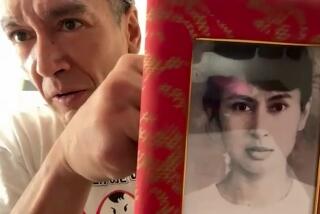Sibling Seeks Release of Ill China Dissident
WASHINGTON — The sister of prominent Chinese dissident Wei Jingsheng said Friday that his health has deteriorated so sharply in prison that he is likely to die soon unless he is released.
Wei Shanshan said President Clinton could win freedom for her brother and perhaps other political prisoners by insisting on their release as a condition for his planned visit to China next year.
She said if Clinton had demanded that China clean up its human rights record before he had agreed to next week’s Washington meeting with Chinese President Jiang Zemin, “Wei Jingsheng would be out by now.”
But, she added, it is not too late for Clinton to use that kind of leverage.
“Jiang Zemin is a man who cares a lot about his image,” she said. “He wants Clinton to go to China to show he is an effective leader.”
At the same time, however, she said she does not want Clinton to call off next week’s summit. Such a step would be too drastic, she said, adding that Clinton may be able to persuade Jiang to relax the Chinese government’s iron suppression of dissent.
“Meeting and talking is one way to improve the human rights situation,” she said. “But we all know that the Chinese government does not care about its moral image. Only when you deal with them in a very pragmatic way will they heed your voice. [Clinton] should exert some real pressure.”
Wei Shanshan, an artist who now lives in exile in Germany, visited Washington to confer with State Department and White House officials about Clinton’s meetings with Jiang, scheduled for Wednesday at the White House.
In an interview, she said her sister and another brother, who still live in China, visited their 47-year-old brother in prison earlier this week and reported an alarming decline in his health.
Wei’s long-term heart condition has worsened, and he has developed a variety of other health problems, she said.
“I fear his life is in danger,” she said.
Wei, a democracy advocate and political essayist, was released from prison in 1993 after serving 14 1/2 years, but in December 1995 he was given a new sentence of 14 years for allegedly attempting to overthrow the government.
Under Chinese law, seriously ill prisoners are entitled to medical parole. But Beijing refuses to acknowledge that Wei is gravely ill.
In the past, Wei has said he would not agree to leave China permanently as a condition for parole. But in light of his deteriorating health, his sister said she believes that she and other family members could persuade him to accept exile if that was the only way to get him out of prison.
“He needs to live,” she said. “If he loses his life, what can he do?”
U.S. Embassy officials in Beijing have said they hoped that China would release Wei and Wang Dan, 27, a former student activist, before Jiang’s visit to Washington. It now seems clear that if there are to be any releases of political prisoners, they will come after the meeting, not before.
Wei Shanshan was in the United States for only a little more than 24 hours, flying back to Germany late Friday night. She expressed regret that she will be unable to participate in human rights demonstrations scheduled in Washington and the other cities that Jiang is to visit: Williamsburg, Va., Philadelphia, New York, Boston and Los Angeles.
“It is a good thing to do,” she said of the protests. “If I didn’t have a 5-month-old baby at home, I would come and join them.”
More to Read
Sign up for Essential California
The most important California stories and recommendations in your inbox every morning.
You may occasionally receive promotional content from the Los Angeles Times.










